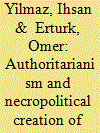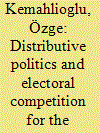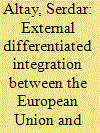| Srl | Item |
| 1 |
ID:
184173


|
|
|
|
|
| Summary/Abstract |
One of the most widely used and influential ways of creating foundational myths for authoritarian legitimation is to construct a necropolitical narrative around the significance of dying for the nation, homeland, state and the leader, i.e. martyrdom. Mbembe’s concept ‘necropolitics’ (the right of the sovereign to determine who shall live and who shall die) has been expanded to include the pollical instrumentalization of martyrdom narratives. However, the literature has not analyzed the necropolitical martyr-icons. This paper aims to address this gap by looking at two historical episodes in Turkey, one in the 1930s dominated by secularists and post-2016 dominated by Islamists.
|
|
|
|
|
|
|
|
|
|
|
|
|
|
|
|
| 2 |
ID:
184172


|
|
|
|
|
| Summary/Abstract |
Competition for the Kurdish vote has been important in contemporary Turkish politics. Focusing on the non-contributory health insurance program in the early period of AKP rule, this article shows that this competition also affected the distribution of benefits. Kurdish citizens’ likelihood of holding a Green Card increased with the competitiveness of the district between the AKP and Kurdish-oriented parties. The number of Green Cards and social spending were also higher when a Kurdish-oriented party posed an electoral challenge. These findings reveal the electoral calculation behind AKP’s strategy of favoring Kurdish voters as well as the importance of political organization for the minority group’s access to benefits.
|
|
|
|
|
|
|
|
|
|
|
|
|
|
|
|
| 3 |
ID:
184174


|
|
|
|
|
| Summary/Abstract |
The forthcoming Customs Union (CU) upgrade negotiations have the potential to stabilize and deepen the ties between the European Union (EU) and Turkey and bring them to a stronger form of external differentiated integration. This article examines the viability of an EU–Turkey Deep and Comprehensive Free Trade Agreement (DCFTA), similar to that between Ukraine and the EU, as an alternative to the CU. The paper contends that a DCFTA would benefit both the EU and Turkey while it would de facto shift the contractual relations from accession conditionality to market access conditionality with potential political repercussions.
|
|
|
|
|
|
|
|
|
|
|
|
|
|
|
|
| 4 |
ID:
184175


|
|
|
|
|
| Summary/Abstract |
In recent years, the externalization of migration governance and external protection of European borders stimulated the redesign of the Turkish migration regime. This externalization faced its major litmus test with the Syrian refugee crisis. This article proposes that Turkey’s accession process to the European Union (EU) and its ongoing collaboration with the EU to control migratory movements altered Turkey’s migration regime significantly. Accordingly, the article aims to tackle the following questions: whether the externalization of European migration governance played a significant role in the redesign of Turkish migration governance, and whether this externalization uncovered new collaboration strategies for Turkey and the EU. To do so, this paper analyses Turkish harmonization to the EU rules on migration governance, and the possible role played by the Syrian refugee crisis on facilitating further adaptation. The paper deduces how the Syrian crisis created new challenges for both Turkey and the EU in migration governance.
|
|
|
|
|
|
|
|
|
|
|
|
|
|
|
|
| 5 |
ID:
184171


|
|
|
|
|
| Summary/Abstract |
Turkey has the highest proportion of young people not in employment, education, or training (NEET) among OECD countries, standing at 26 percent of all those aged 15–29 years. Notably, however, a young woman in Turkey is three times more likely to be out of education and employment than a young man. Based on statistical data on the NEET category and qualitative research drawing on experiences of young NEET women in six large cities in Turkey, this article discusses the gendered characteristics of this category. This article aims to reconcile competing perspectives in youth studies, namely transition and cultural perspectives, and argues for the importance of introducing cultural elements and gender perspective in the NEET literature, for which the Turkish case offers an important case study.
|
|
|
|
|
|
|
|
|
|
|
|
|
|
|
|
| 6 |
ID:
184170


|
|
|
|
|
| Summary/Abstract |
Unlike various natural disasters that some studies have highlighted as potential contributors to peace, the threat posed by the COVID-19 pandemic is neither short-term nor regionally confined. Thus, rather than invoking a compassionate response, the pandemic is likely to aggravate pre-existing divisions and create an environment that accentuates survival over compassion. Building on a large probability survey data gathered in May 2020 in Turkey, we demonstrate that the pandemic has disproportionally affected minority Kurds and exacerbated pre-existing inequalities and social polarization. Results from a series of regression analyses show growing dissatisfaction with the Turkish government’s handling of the pandemic. However, this effect fails to translate into the sense of solidarity between majority Turks and minority Kurds necessary to build a peaceful society. Support for the government’s approach to the Kurdish opposition seems to be conditioned by social categorization and increasingly partisan political identities in Turkey.
|
|
|
|
|
|
|
|
|
|
|
|
|
|
|
|